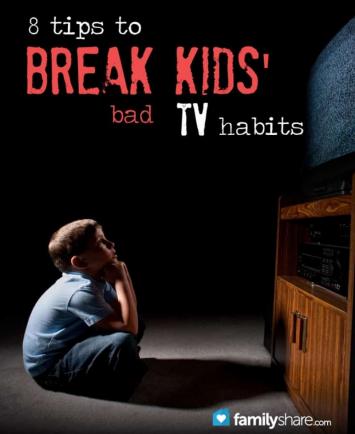
The television has become our society's go-to babysitter for kids of all ages. Kids and parents are addicted to screen time. Letting my daughter watch one show can stretch into four as I blissfully go about my household duties. Then I have to deal with a fit from my zombified child when I turn it off.
Here are 8 tips to break kids' (and parents) bad TV habits.
1.
TV with a purpose
Resist turning on the TV just because it's there. Turn on the TV with a specific purpose in mind. If your child wants to watch her favorite show, let her watch just that show. (Not half of the one before and the two after.) It's OK for your kids to watch TV just to relax, but set a time limit (30 minutes to 1 hour) so the hours don't slip away. Once the TV purpose has been fulfilled, turn it off.
2.
PBS anyone?
Use the TV as an educational tool. If you need your pre-schooler to watch TV while you shower or perform some other task, choose an educational show. If he's learning, it's not wasted time. Your older children may enjoy educational reality TV like Mythbusters, History Detectives or Pawn Stars.
3.
Try it together
Help TV time become bonding time. Find shows your whole family enjoys and watch them together. It's also a good idea to sit and watch TV with your kids on occasion to check out the content of the shows they are watching. You may find something inappropriate has snuck in.
4.
Reward
Make sure other obligations (homework, instrument practice, and chores) are performed before the TV gets turned on. You can also use additional TV time as a reward for extra work or good behavior.
5.
Give your kids options
Usually kids are willing to do something different with free time. Often, TV is just the first thing that pops into their minds. Create a box or list of things your kids can do with free time instead of watching TV. For younger kids, make a box full of art supplies, books, games, small toys and craft materials. Instead of TV, tell them to choose something from the box. My daughter loves paper dolls. For older kids, make a list of hobbies they can refer to.
6.
Go outside
Outdoor play helps kids develop motor skills, problem-solving skills and as a habit leads to lifelong cardiovascular health. School-age children should spend at least an hour in active play every day. (Kidshealth.org) This can be broken up into smaller segments of time. Spending time outdoors is also shown to improve mental health.
7.
Even it up
A good rule of thumb is to make sure your children spend an equal amount of free time outside or participating in electronic free activities as they do in front of a screen. A Kaiser Family Foundation study found that some school-age children are spending as much time with electronics as adults do at a full-time job.
8.
Set the example
If you watch trash, so will your kids. Watch shows that are uplifting, help you understand the world around you and the people in it, or that teach you a new skill. Don't have the TV on in the background of your day. Watch with purpose.
Use the television to enrich your family life, not suck it away. The TV habits your children start now, will likely continue into adulthood and can negatively affect productivity and opportunity. Your kids may resist changes to their screen time at first, but be firm. Once a new habit is formed it will be easier. Good TV habits now mean a brighter future for your kids.

